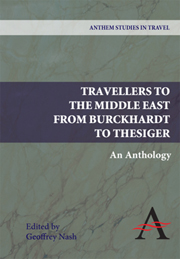Book contents
- Frontmatter
- Contents
- Acknowledgements
- Introduction
- PART ONE THE COMING OF EMPIRE 1800–1879
- The Ottoman Empire and Egypt
- 1 The Spirit of the East
- 2 Eothen
- 3 The Crescent and the Cross
- 4 Eastern Life, Present and Past
- 5 Visits to Monasteries of the Levant
- 6 Letters from Egypt
- Arabia
- Persia
- PART TWO COLONIALISM AND RESISTANCE 1880–1950
- Bibliography
3 - The Crescent and the Cross
from The Ottoman Empire and Egypt
Published online by Cambridge University Press: 05 March 2012
- Frontmatter
- Contents
- Acknowledgements
- Introduction
- PART ONE THE COMING OF EMPIRE 1800–1879
- The Ottoman Empire and Egypt
- 1 The Spirit of the East
- 2 Eothen
- 3 The Crescent and the Cross
- 4 Eastern Life, Present and Past
- 5 Visits to Monasteries of the Levant
- 6 Letters from Egypt
- Arabia
- Persia
- PART TWO COLONIALISM AND RESISTANCE 1880–1950
- Bibliography
Summary
Born in Aughrim Co. Galway the son of a former inspector of constabulary in Ireland, Bartholomew Elliot Warburton was privately educated in Yorkshire before proceeding to Eton, where he met Kinglake, and Trinity College Oxford from where he graduated in 1834. Though called to the Irish bar in 1837 he ‘abandoned the law to superintend his Irish estates, travel and write’ (DNB) adopting the soubriquet ‘Eliot Warburton’ for his works of fiction and travel. His tour of Syria, Palestine and Egypt was conducted some years after Kinglake, in 1843, but The Crescent and The Cross, or, Romance and Realities of Eastern Travel appeared only a year after Eothen, the former strongly imitating the latter as well as rivalling it in popularity during the Victorian period. Warburton died en route to South America when the steamer Amazon caught fire off Lands End.
From:
The Crescent and the Cross (1845)
Chapter VII diverges from Kinglake in its generalizing observations on Egyptian religion and society. Even though Warburton states he intends to write only about the ‘common-place’ mid-nineteenth century – ‘glimpses of men and things in our time are all I can hope to offer’ – he proceeds to reproduce many of the Orientalist and racial categorizations that become typical of much later Victorian writing on the Egyptian scene and indeed on the Middle East overall. His knowledge of Egypt comes more from Edward Lane than from his own observation.
- Type
- Chapter
- Information
- Travellers to the Middle EastAn Anthology, pp. 17 - 24Publisher: Anthem PressPrint publication year: 2009



